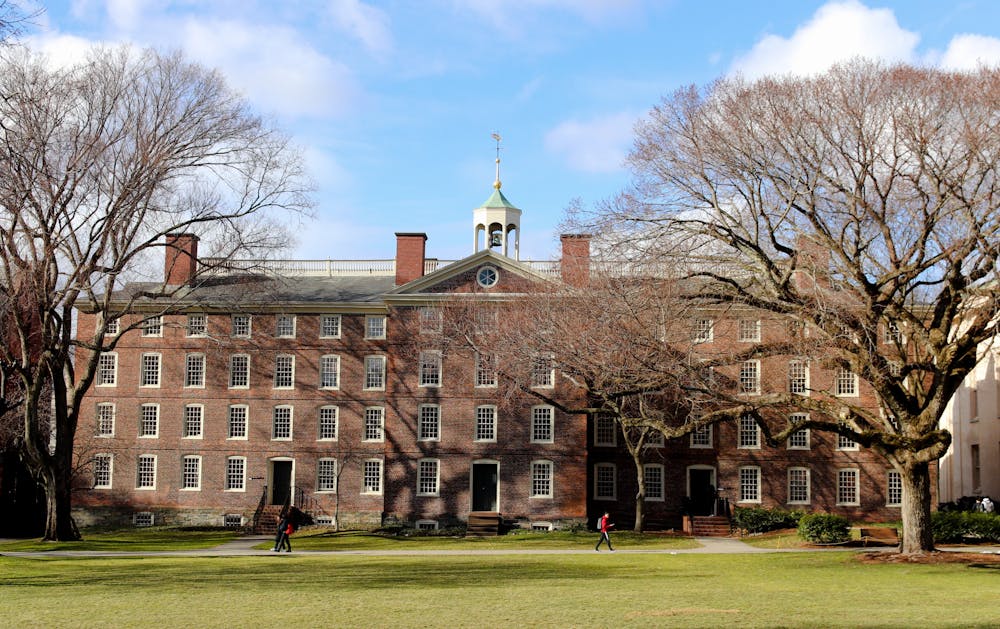The University’s Advisory Committee on University Resources Management released its recommendations on a proposal by Scholars at Brown for Climate Action to revise the University’s gift acceptance policy and business ethics policy, according to a March 2 Today@Brown announcement from President Christina Paxson P’19.
ACURM — an advisory committee that evaluates the ethics of the University’s investment and business practices in accordance with its mission and values — has developed three recommendations in response to SBCA’s proposals, which were written by a group of faculty, staff and students that advocates for the University to take leading action on climate change.
These recommendations serve as a guide to Paxson and the Corporation — the University’s highest governing body — but are not enforceable on their own.
SBCA’s proposals — the original submitted Nov. 4 and the amended version submitted Jan. 26 — ask the University to change its gift and business policies to set minimum standards that preclude Brown from working with businesses that perpetuate climate denial or disinformation. The amended proposal “narrowed the focus” of the proposed regulations, such as by exempting research funding from the policy, according to the memo.
The amended policy would apply to gift and grant acceptance while excluding faculty research funding, Paxson wrote in her letter.
ACURM’s report to the president on SBCA’s petitions presents three recommendations. The first is to amend the University’s business ethics policy to “indicate Brown’s refusal to do business with organizations that knowingly undermine science or science-based policy, or support organizations that advance climate science disinformation,” according to the report.
The second recommendation put forward by ACURM is to maintain the current gift acceptance policy, which they wrote “implicitly requires the same ethical standard of engagement as the newly amended business ethics policy.”
The final recommendation is to create a path to take actions against organizations that deny climate change, spread climate disinformation or support other organizations that disseminate climate disinformation.
ACURM further recommended that the University focus on “organizations that knowingly and directly undermine science,” Paxson wrote.
SBCA submitted a concept note Feb. 4, which suggests a four-stage procedure to identify “organizations and supporters of climate denial.” The procedure involves creating a list of climate denial organizations, reviewing information about these organizations, researching their funding and flagging their activities as “yellow” or “red.”
“Red” organizations would not be permitted to do business with the University, while “yellow” organizations may be required to submit documentation in one to two years about their activities to avoid being demoted to “red,” according to the concept note.
The note also suggests this could be implemented through “internal, Brown-based” research or by “a consortium of universities and non-profits.”
Paxson mentioned ACURM’s evaluation of the University’s business policy at a faculty meeting Dec. 7 in response to concerns expressed by some professors about Koch Foundation, which is run by billionaire and conservative political mega-donor Charles Koch, contributions to the Political Theory Project in discussions of the proposed Center for Philosophy, Politics and Economics, The Herald previously reported.
Faculty discussions of the PPE Center were postponed at the February and March meetings, with some professors citing a desire to wait until ACURM’s recommendations for the business ethics policy were released. The vote is now set to occur at the May faculty meeting.
J. Timmons Roberts, professor of environmental studies and sociology, said at the March 1 faculty meeting that “Brown could become a leader in this area by leading an effort to create a clearing house or protocol … to screen donors and business partners,” The Herald previously reported.
“Large non-profits and universities will be very interested in this,” Roberts added. “We could make a huge difference on a number of issues that are really fundamental to our values.”
Community members can comment on ACURM’s report via a feedback form through March 11. Additionally, members of the community will be able to discuss the recommendations in a virtual meeting hosted by the Brown University Community Council March 3 at 4 p.m. A Faculty Commons on the subject will be held March 18.
In her Today@Brown message, Paxson invited all community members to offer public comment, writing, “the feedback I receive will help inform a decision on ACURM’s recommendations."
Caleb Lazar was the senior editor of data desk for The Brown Daily Herald's 133rd Editorial Board.





